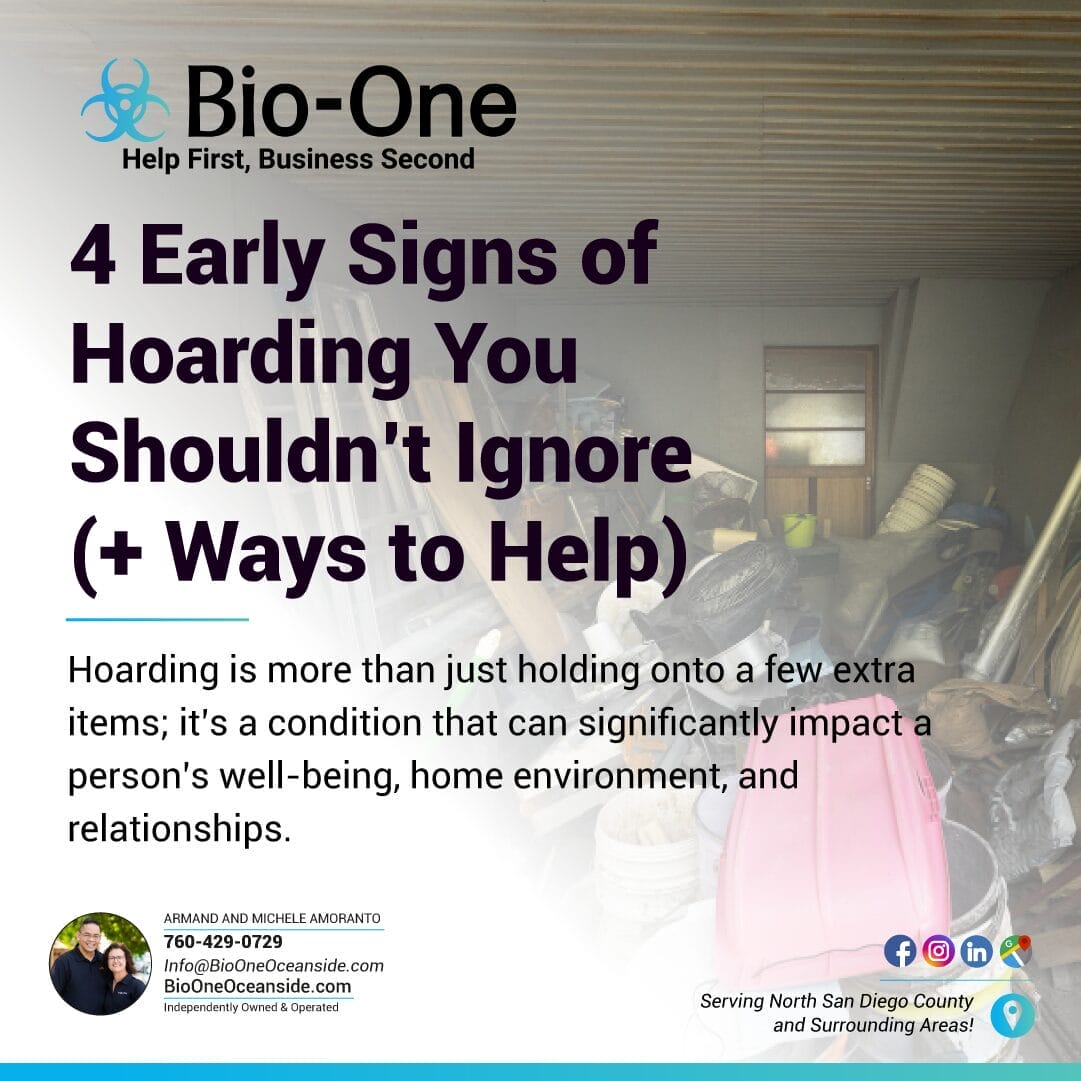
Hoarding disorder often starts subtly, with small changes that can go unnoticed. Unfortunately, left unaddressed, it can escalate into a serious issue that affects mental health, personal relationships, and living environments. Recognizing the early signs of hoarding is crucial, as early intervention can make a significant difference.
If you or someone you care about is showing these behaviors, it’s essential to approach the situation with empathy and understanding. This blog will help you identify the early signs of hoarding and provide actionable steps to support someone who may be struggling.
Hoarding is more than just keeping a messy house or having trouble letting go of sentimental items. It’s a complex mental health condition often rooted in anxiety, depression, or trauma. Hoarding can hinder daily living, compromise safety, and damage relationships.
Recognizing these behaviors early can allow for timely intervention, reducing the emotional and physical burdens that later stages of hoarding might cause.
One of the hallmark signs of hoarding is the emotional attachment to belongings, even those that seem insignificant or useless (e.g., old newspapers, expired coupons, broken gadgets).
Why this matters:
This behavior often stems from the fear of losing something valuable or making the wrong decision. The person may feel guilt, anxiety, or even sadness when considering getting rid of these items.
How to help:
People struggling with hoarding often collect and retain large quantities of items without having a clear reason for doing so. These items can include clothes, mail, food containers, or even free promotional gifts.
Why this matters:
Accumulation typically begins gradually. The person may believe these items “could be useful someday,” even if there’s no realistic need for them. Over time, unused piles can grow, making spaces unusable and creating hazards.
How to help:
One of the earliest visible symptoms of hoarding is when living spaces—such as countertops, tables, or even bathtubs—start to fill up with clutter. This can make it difficult to move freely or use areas as intended.
Why this matters:
The clutter may seem manageable initially, but as it grows, it can restrict day-to-day activities, increase safety risks (such as falls or fire hazards), and cause embarrassment, leading the person to isolate themselves socially.
How to help:
Individuals in the early stages of hoarding might start canceling plans or avoiding visitors due to embarrassment about their living conditions. What might feel like an isolated choice could actually reflect deeper feelings of guilt, anxiety, and shame.
Why this matters:
Isolation can exacerbate the emotional difficulties that contribute to hoarding, creating a harmful cycle where the clutter worsens and the person becomes even more withdrawn.
How to help:
Understanding and compassion are key when helping someone who may be struggling with hoarding. Here are some strategies to offer meaningful support:
Learning more about hoarding disorder can help you approach the situation with informed empathy. Understanding that this is a mental health condition—and not just "messiness" or "laziness"—can guide your responses.
A therapist or counselor who specializes in hoarding disorder or cognitive behavioral therapy (CBT) can provide valuable assistance. Hoarding cleanup professionals can also be a great resource in safely restoring living spaces.
Big projects can feel overwhelming. Celebrate each step forward, no matter how small. Whether it’s clearing out one corner or recycling a single bag of items, progress builds momentum.
Pressuring someone to declutter quickly can lead to mistrust or increased anxiety. Instead, prioritize their emotional needs and work at their pace.
If the situation feels too overwhelming, know that you’re not alone in addressing it. Professional hoarding cleanup services can provide discreet, compassionate help to restore a safe and functional living environment. These teams understand the emotional challenges of hoarding and work to create a respectful and judgment-free experience.
At Bio-One of Oceanside, we specialize in hoarding cleanup with unmatched care and professionalism. Our goal is to lift the load—both physical and emotional—while preserving your or your loved one’s dignity.
Early intervention can make a lasting difference for someone struggling with hoarding tendencies. Recognizing the signs and offering compassionate support can go a long way in helping them regain control of their home and quality of life.
If you or a loved one needs help, don’t hesitate to reach out. Contact Bio-One of Oceanside and Bio-One of South OC today for expert assistance from people who truly care.
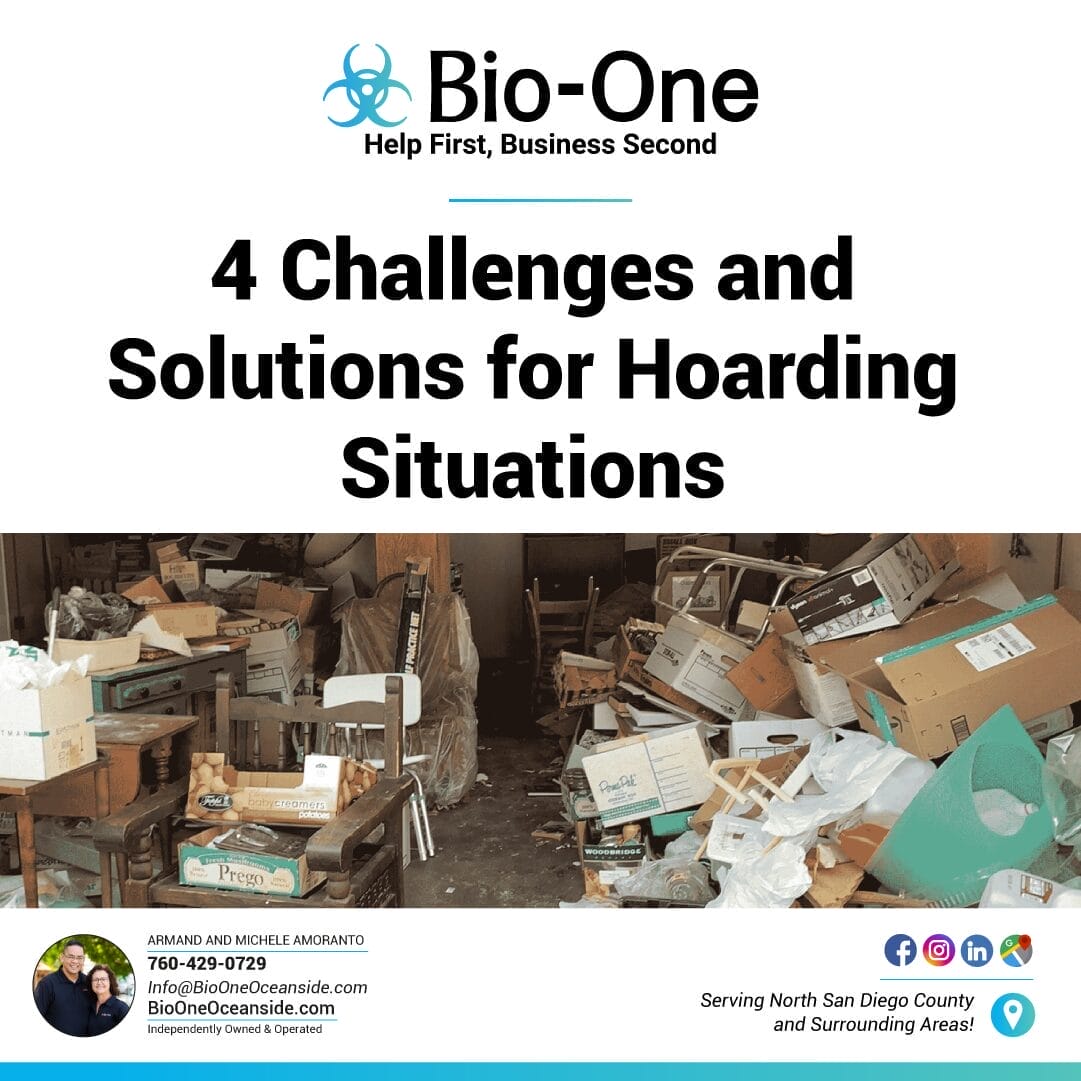
While hoarding has gradually become a more recognized mental health issue, it remains a thorny challenge for individuals and families. Navigating the emotional and practical aspects of hoarding can seem like an overwhelming task with no clear path forward. This post was conceived with the idea of providing solutions for hoarding, and a roadmap for anyone struggling with these tendencies.
Disclaimer: Please note that while this post is designed to offer guidance and support for those dealing with hoarding tendencies, it is important to remember that we are not mental health professionals. Our aim is to tackle each hoarding situation with the utmost care, compassion, and discretion, providing educational and informative content to assist in the process. For professional advice and treatment, we strongly encourage consulting with a qualified mental health expert.
Hoarding is more than just excessive accumulation; it's a mental health disorder that can significantly impair a person's ability to function. The Diagnostic and Statistical Manual of Mental Disorders (DSM-5) characterizes hoarding as a persistent difficulty in discarding possessions, regardless of their actual value.
The impact of hoarding extends beyond the physical environment. People with Hoarding Disorder often face emotional distress, which may lead to anxiety, depression, and strained relationships.
One of the core issues for those with Hoarding Disorder is an inability to make decisions about their possessions. This paralysis can stem from a variety of factors, including perfectionism, fear of making a wrong decision, and attachment to sentimental items.
Organizing a hoarder's house may seem like a simple solution, but it often fails to address the root of the issue. For hoarders, sorting through their belongings and deciding what to keep or discard is emotionally charged and overwhelming.

Hoarders often struggle with intense feelings of shame about their living conditions, typically resulting in self-imposed isolation. The stigma associated with hoarding further compounds the challenges of seeking help and maintaining social connections.
Even after a successful decluttering effort, there is a risk of relapse. Without addressing the underlying psychological factors, the hoarding behavior may return, leading to discouragement and a sense of failure.
Empowering hoarders to make decisions about their possessions is critical. Strategies such as setting small, attainable goals, categorizing items, and seeking professional help can make the decision-making process more manageable.
Developing a clear, step-by-step organizing plan is essential. This includes setting up a system for categorizing items, utilizing storage solutions, and maintaining regular cleaning routines to prevent re-accumulation of clutter.
Learn more: Tips for Helping a Loved One Dealing With Hoarding Disorder | Bio-One of Poway
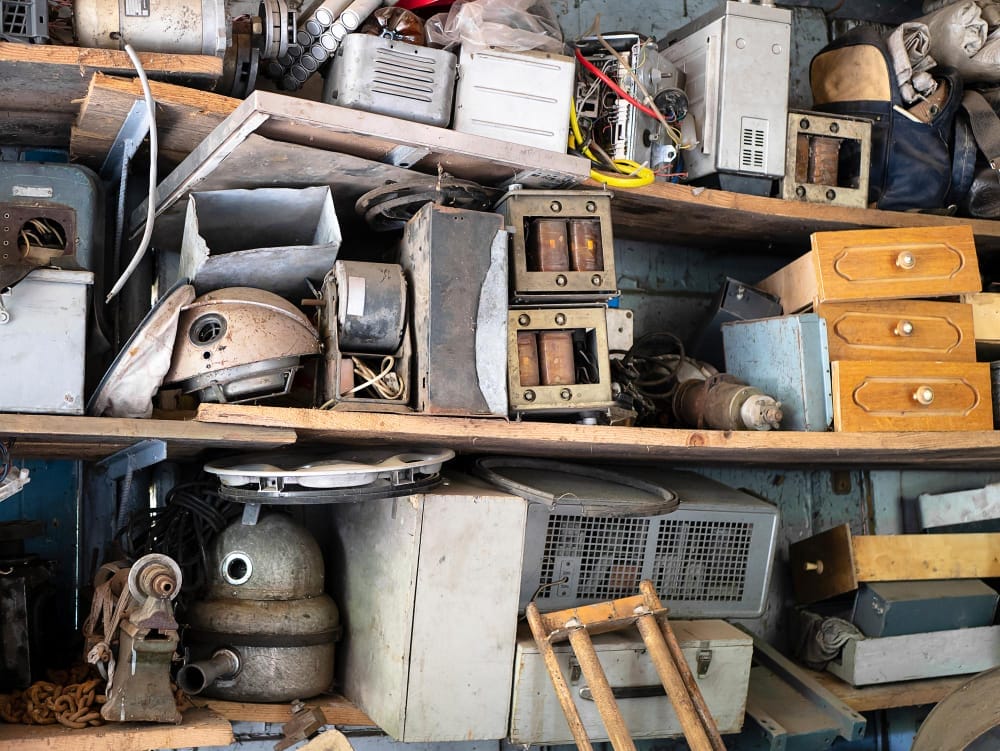
Open and supportive communication with family and friends is key to overcoming the isolation that hoarders may feel. Seeking support from a therapist, support group, or professional organizer can create a safe environment to address feelings of shame and isolation.
Long-term strategies to prevent relapse involve ongoing therapy, regular monitoring of the living space, and the development of healthy coping mechanisms. It is also important to establish a support network that can offer encouragement and practical assistance. Cleaning is not the solution to hoarding.
Engaging with support groups provides a sense of community and understanding. Professional organizers can offer practical skills and an objective perspective that is often crucial in the recovery process.
Real-life examples of those who have overcome hoarding can serve as inspiration and provide insights into effective strategies for change. Success stories often highlight the importance of persistence, self-compassion, and the support of others. Here's a case from one of our first customers, whom we were to assist with a severe hoarding situation for its elderly client:
The path to recovery is unique for each person, but the common thread among successful outcomes is the willingness to seek help, develop coping skills, and build a support network. For those struggling with hoarding, remember that change is possible, and the process does not have to be faced alone.
Whether it's through a local support group or the comfort of those who understand, there are paths to a brighter, clutter-free future. We converted it all in our Bio-One of South OC blog post on how to approach hoarding: Support Groups and Resources for Those Affected by Hoarding
If you're dealing with hoarding, or know someone who is, remember that professional help is available. At Bio-One of Oceanside, we understand the delicate nature of hoarding situations and approach each case with compassion, patience, and understanding.
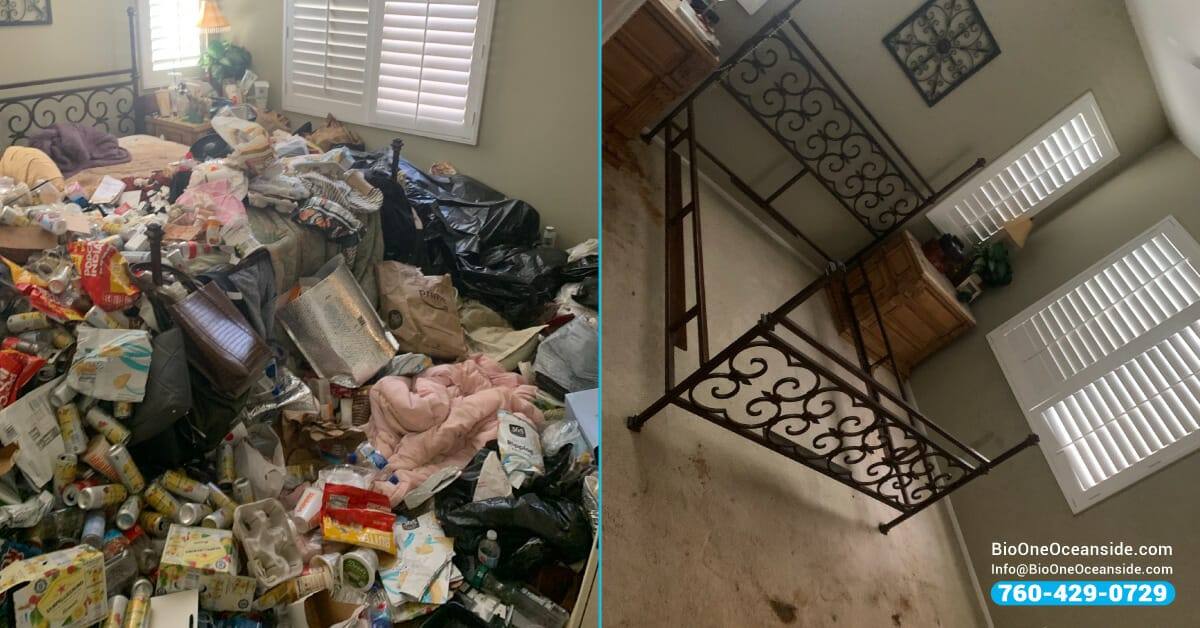
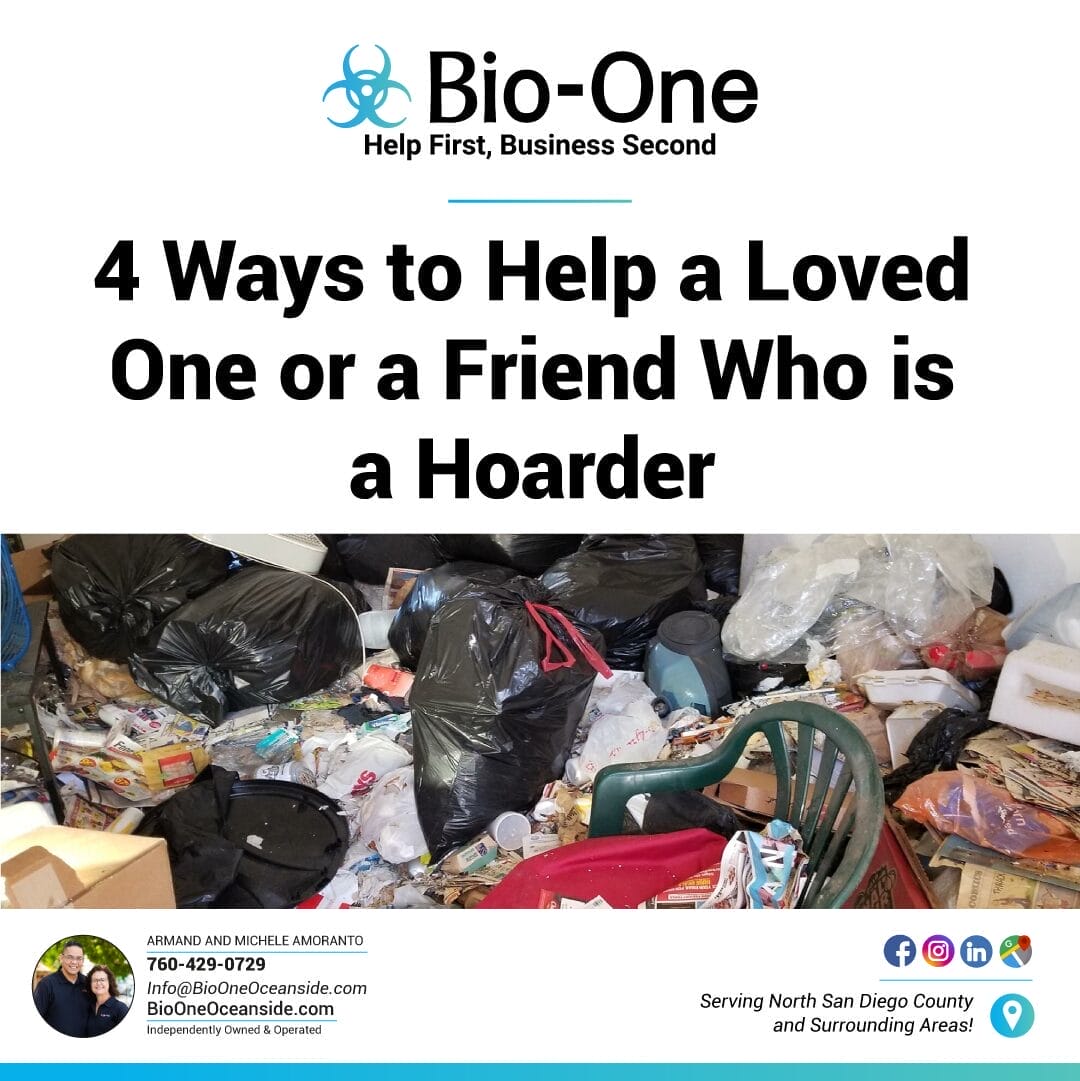
The struggle with hoarding can deeply affect not only the hoarder but also their friends and family. If you know someone who is wrestling with hoarding tendencies, it can be challenging to know how to approach them and provide the support they need. You might feel overwhelmed at what to do, and even a little scared to address the issue. Here are four ways to effective hoarder help.
Support assertion: We understand the complexities involved in restoring a home affected by hoarding. From decluttering to deep cleaning, our dedicated team approaches each situation with sensitivity and professionalism. Not only do we tackle the physical restoration of living spaces, but we also provide channels for emotional support and ongoing help for those impacted. Trust us to be a compassionate and efficient partner in your journey towards a cleaner, serene home environment.
To help a loved one who is a hoarder, begin by learning all you can about hoarding disorder. Education is the bedrock upon which informed, effective help is built. But what does educating yourself on hoarding involve?
Hoarding is more than just clutter; it's a mental health issue that drastically affects a person's day-to-day life, often resulting in significant distress and functional impairment. Recognize the hallmarks of hoarding, such as the difficulty in parting with possessions, the need to acquire items, and a strong distaste for waste, and how these characteristics impact their life.
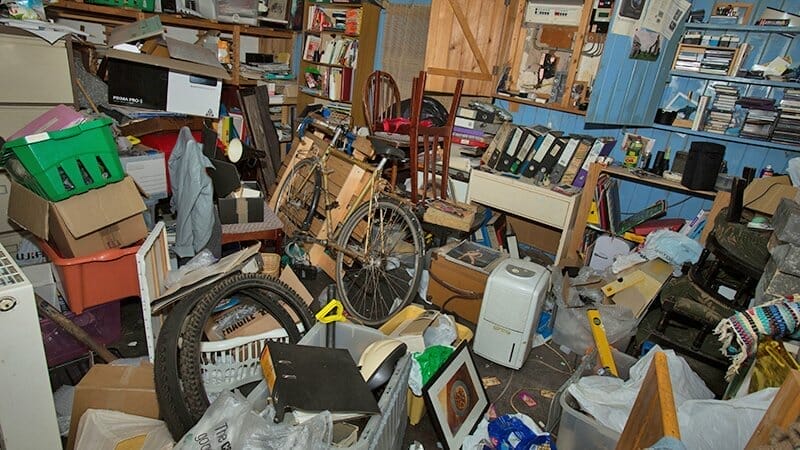
When reaching out to a friend who hoards, it's vital to approach the topic with immense empathy and understanding.
Resist the urge to label or criticize their behavior. Instead, express your concerns from a place of love and support, and make it clear that you're there to help them through this.
Offer them a safe space to express their emotions, without fear of judgment. Hoarders often feel misunderstood and alone, so your ability to listen and validate their feelings is incredibly powerful.
Simply being present for your friend can provide a significant emotional anchor. Sometimes reassurance that they are not alone in their struggle can make all the difference.

While your support is crucial, the most effective help will often come from professionals trained to work with Hoarding Disorder.
Knowledge empowers you to help your friend find the right resources. From cognitive-behavioral therapy to professional organizers with experience in hoarder help, various options can offer meaningful help. Research local therapists or support groups and familiarize yourself with their work.

Finding the right professional can be daunting, so offer to assist in this search. A hoarding specialist or support group can provide tailored guidance and a supportive community.
Sometimes the support of a loved one can make it easier for a hoarder to take the first step toward professional help. Offer to attend therapy sessions or support group meetings with them.
As your loved one with hoarding becomes better equipped to face their hoarding, practical assistance can be remarkably helpful. Approach the task of decluttering and organizing with patience and sensitivity. Set achievable goals and work at a pace that's comfortable for your friend.
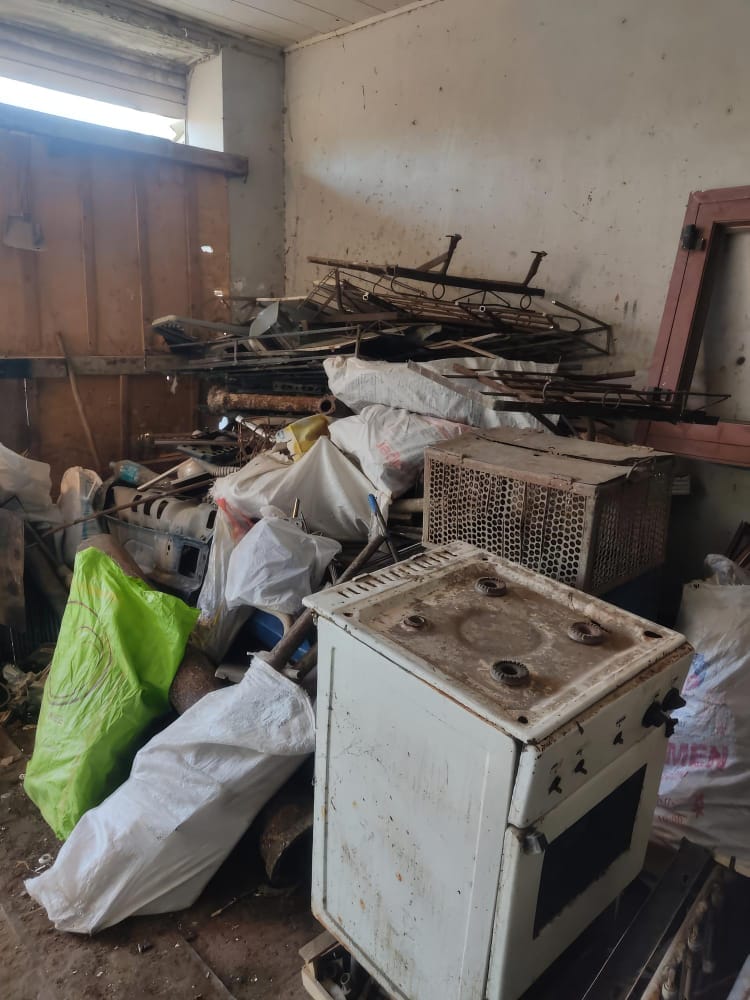
Take a look at our 4-Step Plan For a Successful Hoarding Cleaning with Bio-One.
Help them understand that decluttering doesn't mean getting rid of everything at once. Gradual releases are okay; the goal is to make decisions about possessions with increasing ease over time.
Remember, Hoarding Disorder doesn't resolve overnight. It is built on years of coping mechanisms and may take just as long to dismantle. Be patient and willing to provide ongoing support as your friend or loved one navigates their recovery.
As you embark on this path of support and understanding, remember that sometimes professional hoarding remediation services like Bio-One of Oceanside are the best way to provide a fresh start for your loved one. Bio-One's deep cleaning services are compassionate and thorough, designed to assist hoarders in parting with their items while maintaining their dignity and privacy.
Ultimately, the most important things you can offer are your time, your understanding, and your unwavering support. Together, with the right resources and allies, you and your loved one can work through the journey of overcoming hoarding.
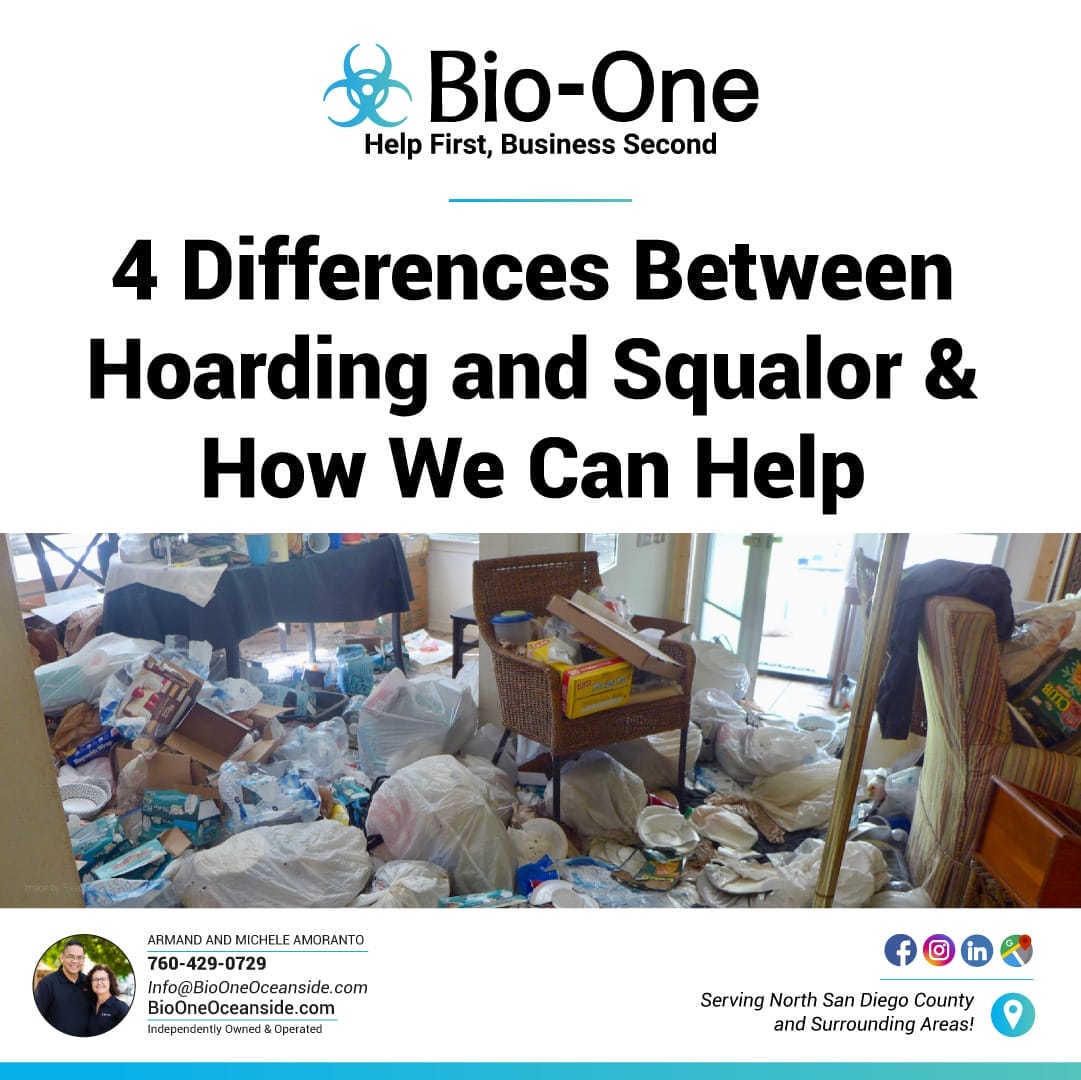
Hoarding and squalor are two terms often used interchangeably, but they refer to different situations. While both involve excessive clutter and disorganization, each has distinct characteristics and underlying causes. In this blog post, we'll explore the differences between hoarding and squalor and discuss how our team at Bio-One of Oceanside can help those affected by these issues.
Hoarding is a mental health disorder characterized by an excessive accumulation of items and difficulty discarding them. People who hoard have a strong emotional attachment to their possessions, often believing that they will need them in the future or that they have sentimental value. Hoarding usually results in overwhelming clutter that can impede daily living activities and pose safety hazards.
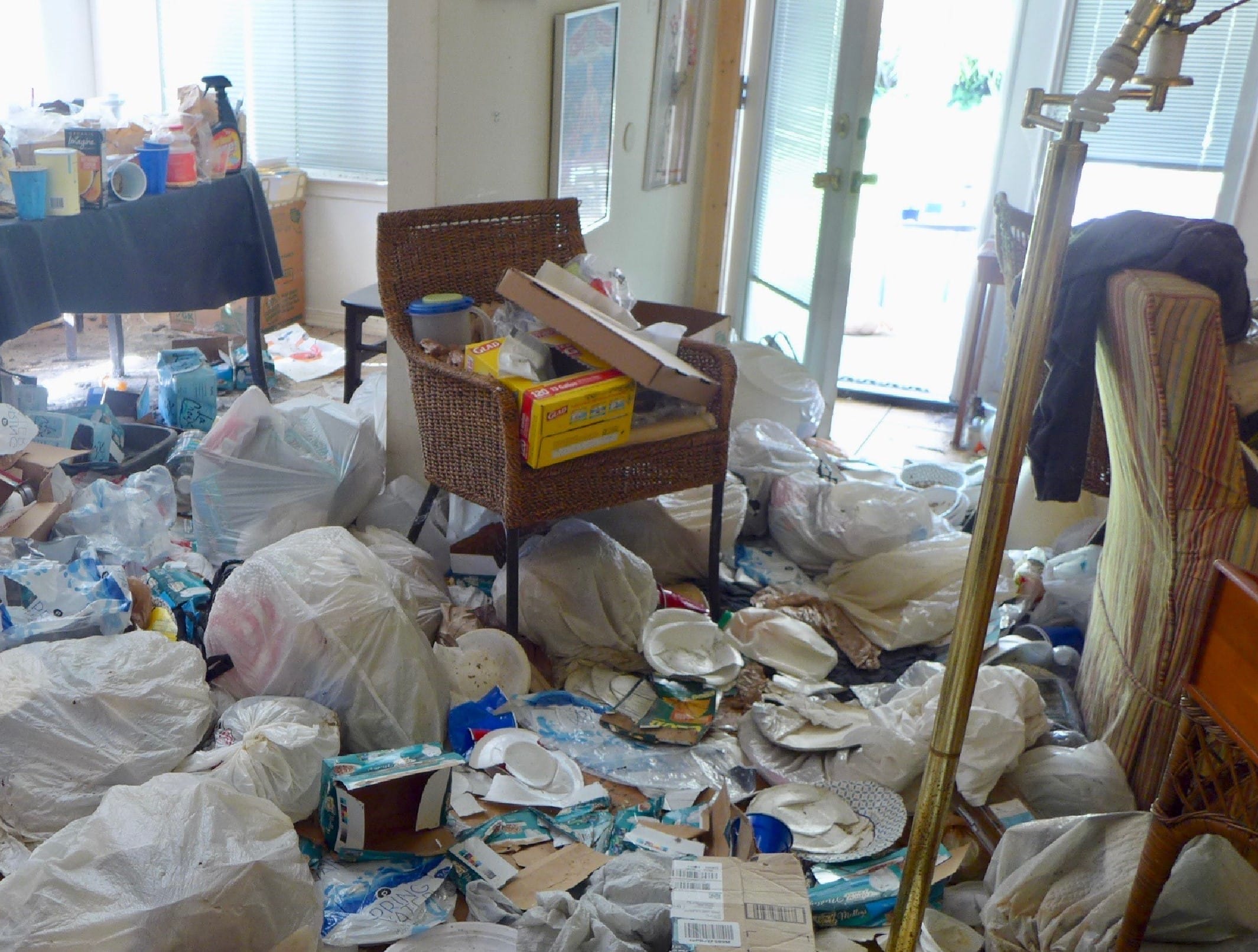
Squalor, on the other hand, refers to a living environment that is extremely unclean and unsanitary. It often occurs as a result of neglect or an inability to maintain a clean living space. People who live in squalor may not necessarily have a hoarding disorder, but they struggle with keeping their living space clean and organized.
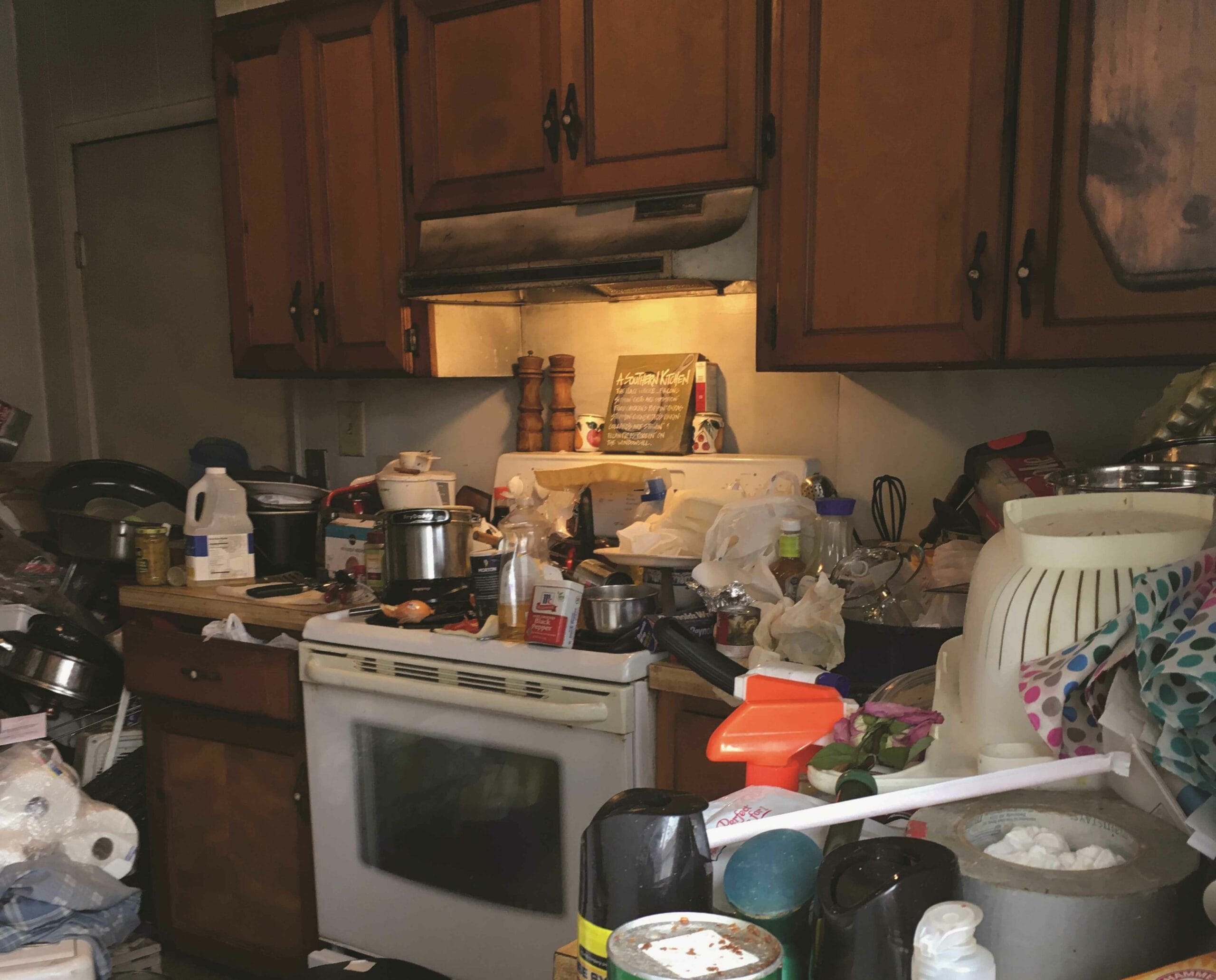
Hoarding and squalor can often occur together, but they are not the same thing. While hoarding is a mental health disorder, squalor is a symptom that can result from it. For example, a hoarder may have difficulty discarding items, leading to excessive clutter and eventually squalor.
However, not all hoarders live in squalor, and not all people living in squalor have a hoarding disorder. Both conditions can coexist or occur separately. Treatment for hoarding does not necessarily address the squalor, and vice versa.
While both conditions manifest in poor living conditions, each arises from distinct causes and has unique characteristics. Here are four key differences between hoarding and squalor:
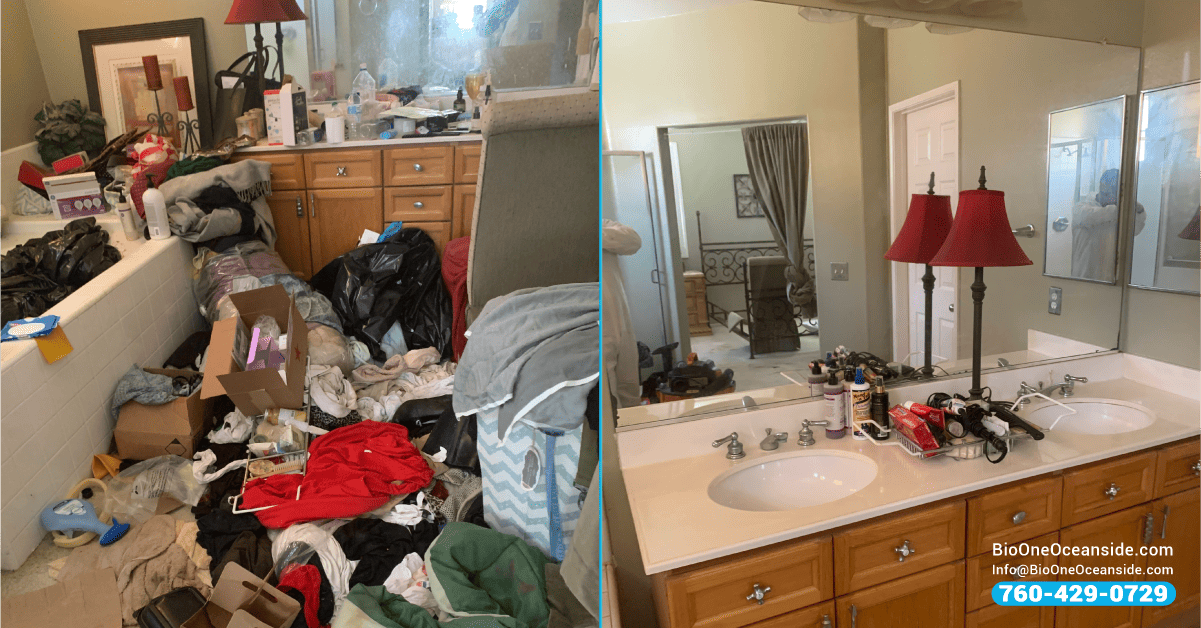
With proper treatment and support, both hoarding and squalor can be overcome. Here are some ways to address these conditions:

One common misconception about Hoarding Disorder is that it is a choice or a result of laziness. However, research has shown that HD is a complex condition influenced by factors like genetics, brain structure and function, and life experiences. Therefore, it's essential to approach treatment with empathy and understanding.
Furthermore, recovery from hoarding is not a one-time event; it requires continuous support and effort. Even after completing a treatment program, individuals may still struggle with triggers and relapses. Therefore, seeking ongoing support is crucial in maintaining progress and preventing a relapse.
Here at Bio-One of Oceanside, we understand the challenges faced by individuals struggling with hoarding and squalor. Our trained professionals offer compassionate and discreet services to help declutter and restore living spaces affected by any of these scenarios.
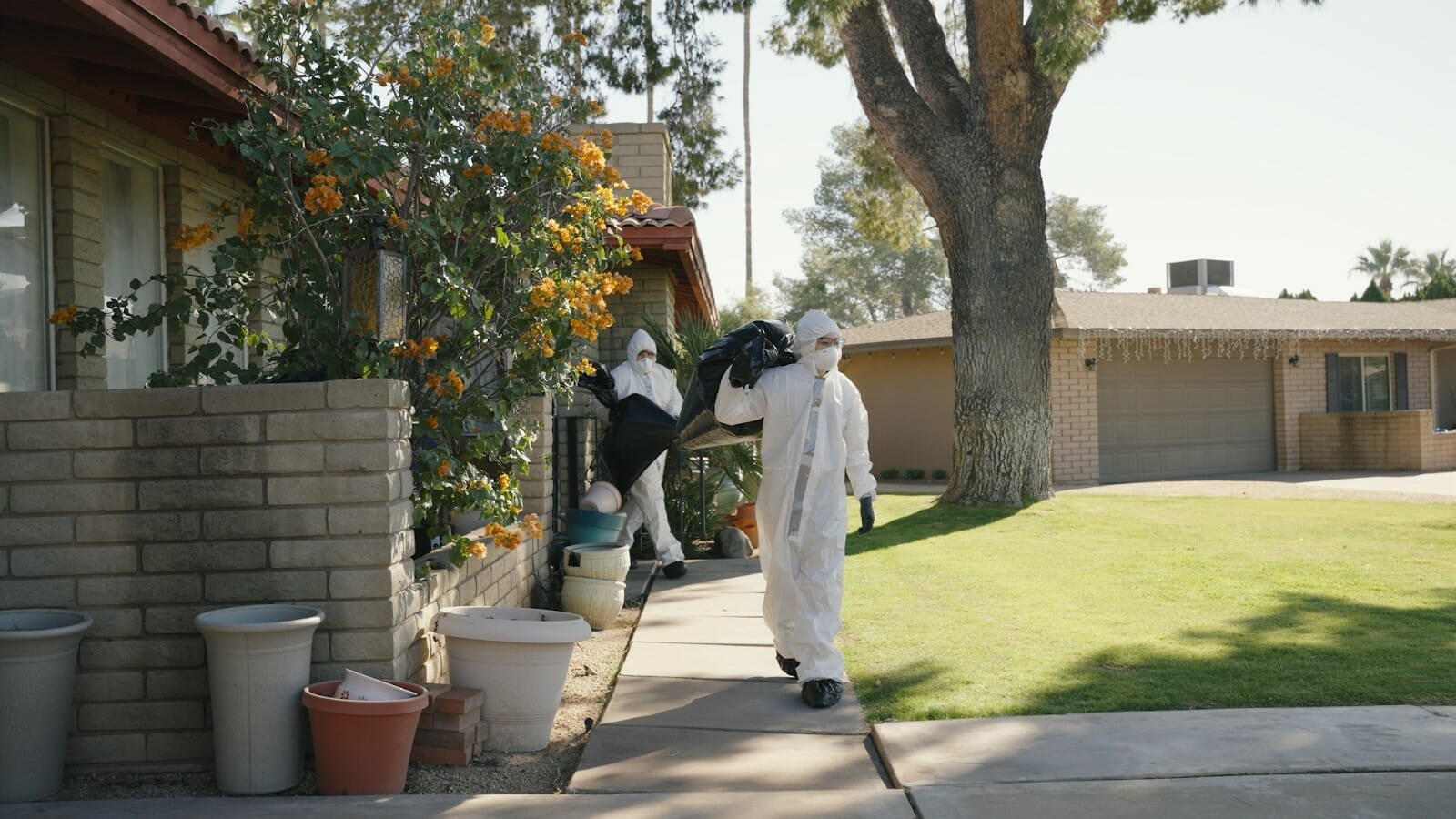
Additionally, we provide ongoing support and resources to assist individuals in maintaining a clutter-free environment. Our team is committed to helping those with hoarding overcome their challenges and accomplish a healthier, happier life. If you or a loved one is struggling with hoarding and squalor, don't hesitate to reach out to Bio-One of Oceanside. We are here to help and support you every step of the way!
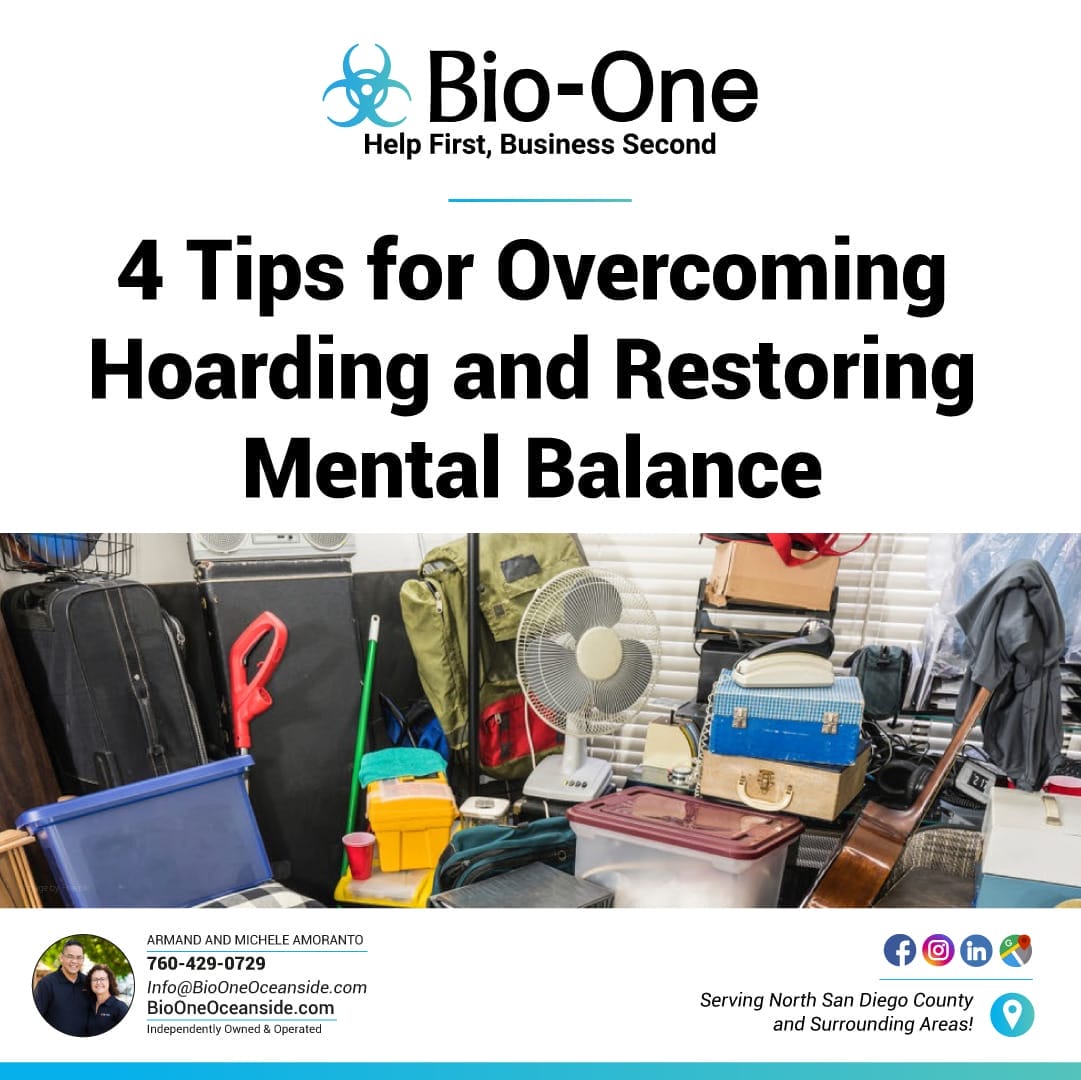
Hoarding disorder is a mental illness that makes it difficult for individuals to discard or let go of possessions, leading to an accumulation of clutter that can disrupt their normal daily lives. This disorder affects individuals differently, some may hoard items such as food and clothing, while others may hoard animals or trash. Hoarding disorder can lead to unsanitary living conditions, social isolation, and even health risks. In this blog, we will discuss four tips for overcoming hoarding and restoring mental balance.
A mental health professional can help diagnose Hoarding Disorder and provide treatment options. Treatment may include therapy, medication, or a combination of both. Cognitive-behavioral therapy (CBT) is a widely used therapy that is effective in treating hoarding. CBT helps individuals recognize and change negative thinking patterns related to hoarding. It also helps individuals develop skills to manage stress, anxiety, and decision-making.

Regardless of the approach the professionals may suggest, don't think of it as something bad, or something that makes you weak. Seeking help is a sign of strength and shows that you are determined to overcome hoarding and improve your mental well-being.
Joining a support group can help overcome Hoarding Disorder. Support groups provide a safe environment where individuals can share experiences, and offer support and strategies for overcoming the condition together. In support groups, hoarders can also relate to others and learn mindfulness techniques that can help reduce anxiety and stress.
Here's a link to the International OCD Foundation, in the Hoarding Section, to find a support group in your area: Find a Hoarding Support Group
Hoarding did not develop overnight, and it can't be overcome overnight. It is essential to start small and set achievable goals. When embarking on the journey of overcoming hoarding, and deciding to clean up your home (or your loved one's home), we recommend the following:
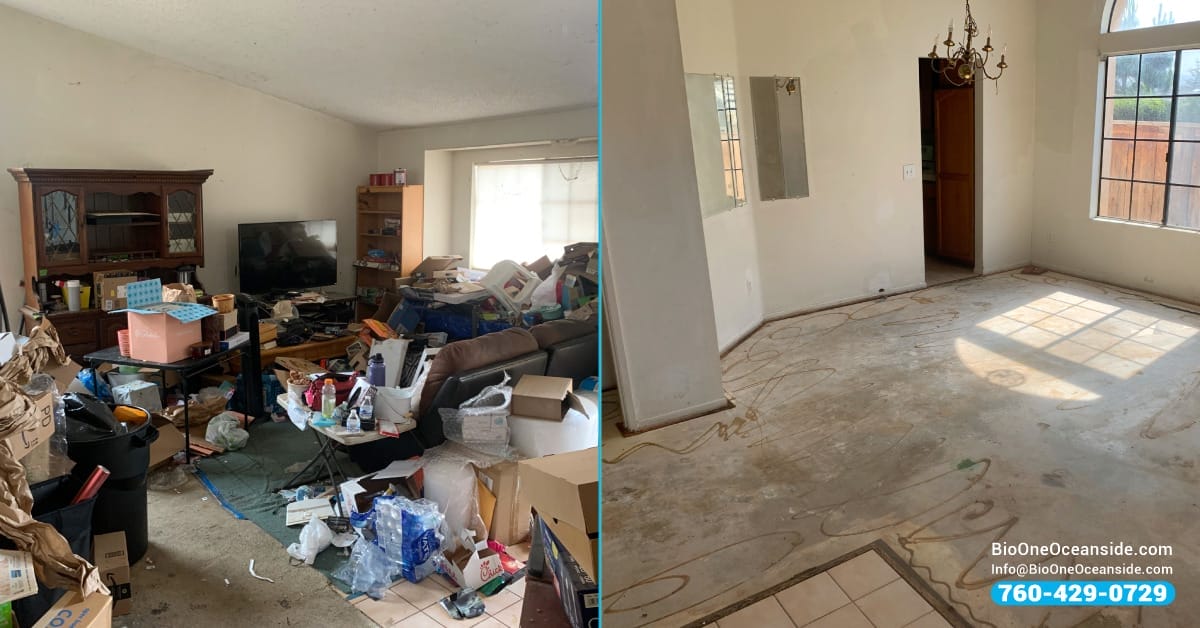
It is also crucial to remember that progress will not always be linear. There may be setbacks and moments of difficulty, but it's important to keep pushing forward and celebrating small victories along the way.
Learn more: The 4-Step Guide for Cleaning a Hoarder's House with Bio-One
While support groups can offer valuable guidance and support, hoarding is a complex mental health condition that may require professional help. Aside from the recommended assistance from a mental health professional, and these tips for overcoming hoarding, a cleanup or restoration company can tackle the dangers of the hoarded home.
Though it's usually ignored, hoarded homes pose many physical hazards that include:
These risks can put the safety and well-being of both the hoarder and their family at risk. Therefore, it's important to seek professional help in extreme cases, especially when facing severe hoarding situations.
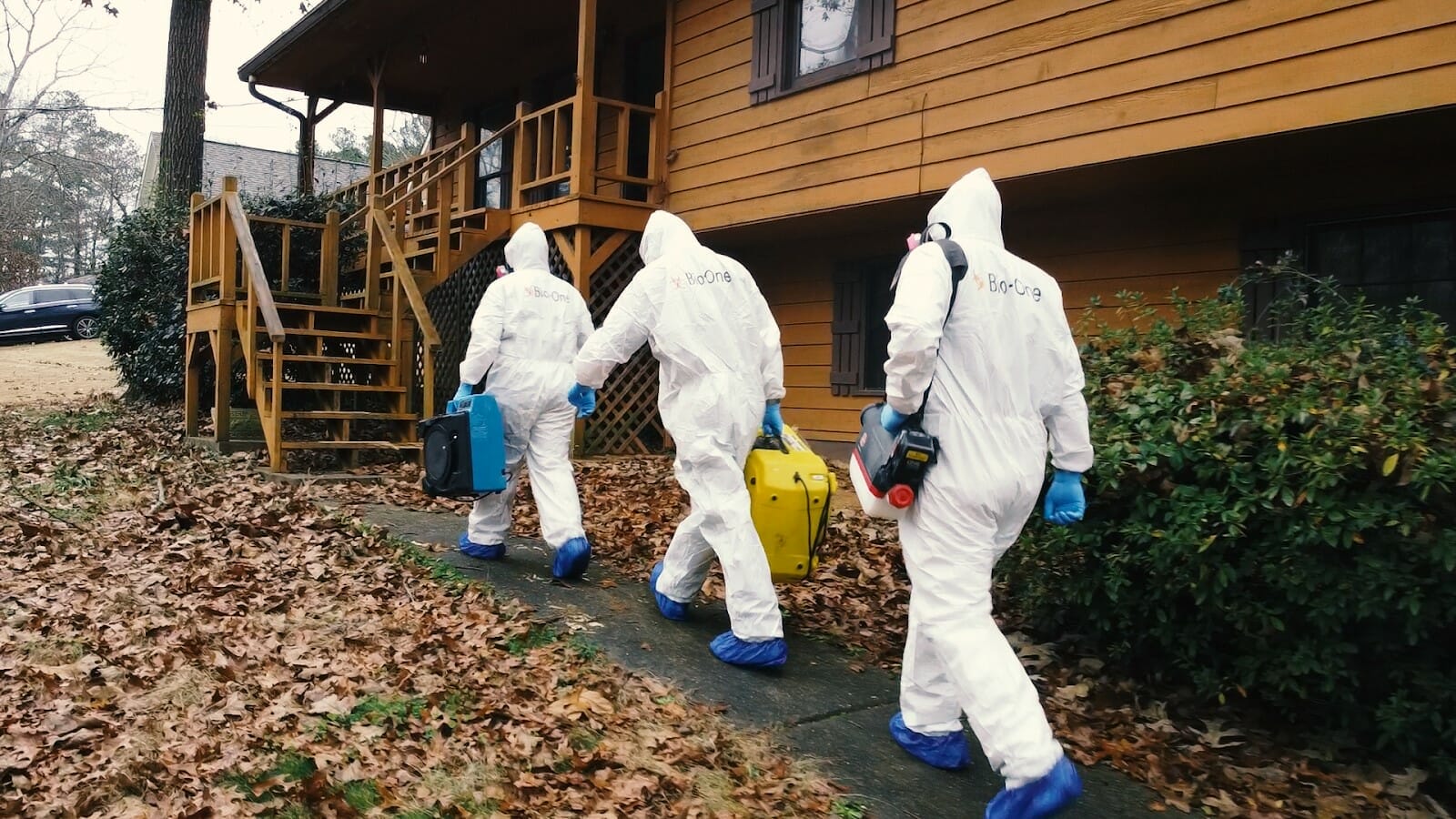
Seeking professional help, starting small, joining a support group, and getting professional cleaning assistance are four tips for overcoming hoarding and restoring mental balance. Make sure to share them with your loved ones, or try your best to apply them to your reality.
At Bio-One of Oceanside, we're here to help. Our professional cleaners are specialized in hoarding cleanup and can offer guidance and support. If you or someone you know is dealing with Hoarding Disorder, contact Bio-One of Oceanside for assistance. Our compassionate team is ready to help you restore your home and take the first step towards overcoming hoarding.
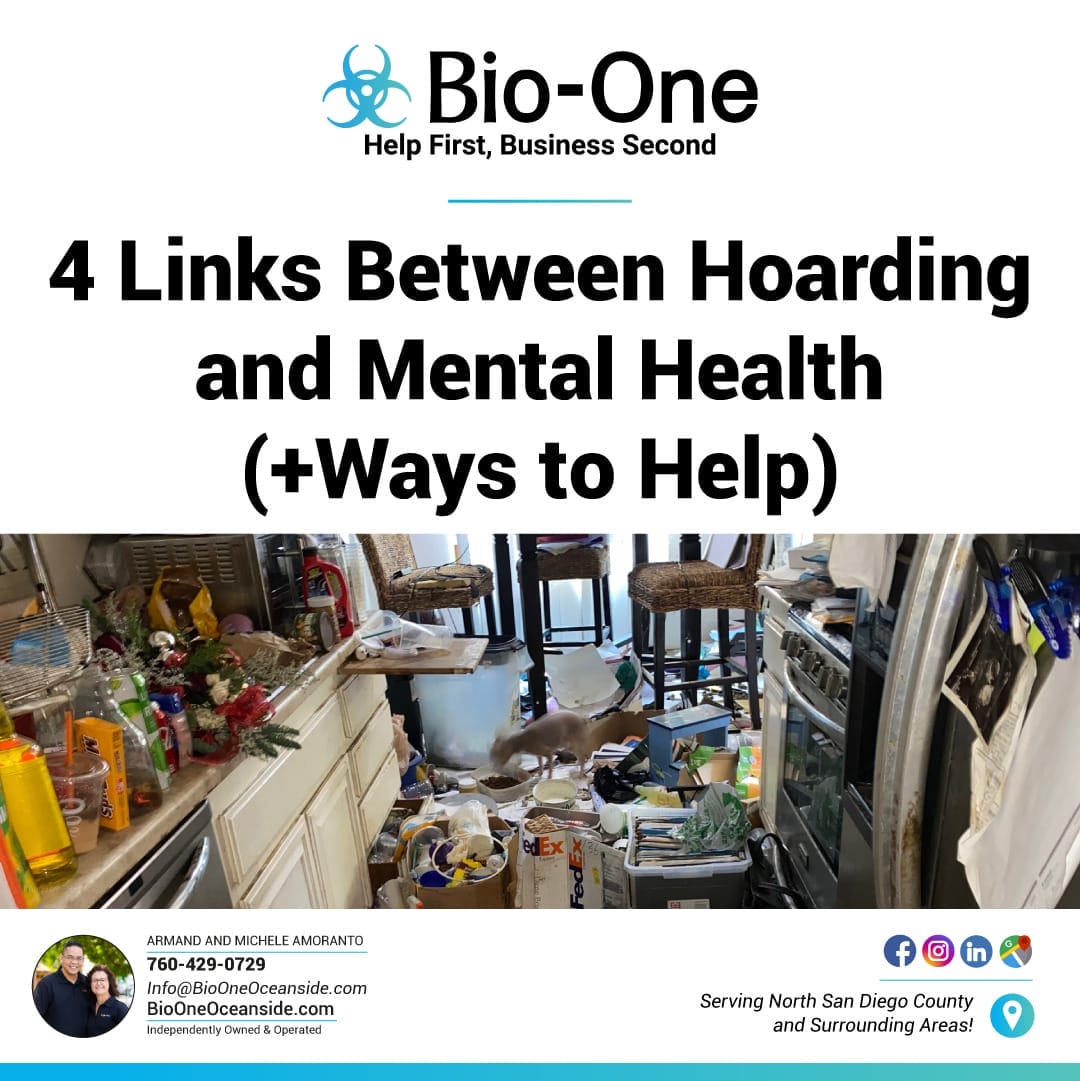
Hoarding affects millions of people worldwide, from all walks of life. It's a condition where individuals feel the need to accumulate and save things, even if they hold little to no value. Unfortunately, many individuals who struggle with hoarding may also experience other mental health conditions that exacerbate their symptoms. In this post, we’ll explore four links between hoarding and mental health, and offer some ways to help someone who is struggling.
Disclaimer: The information provided in this post is intended to create awareness about the relationship between hoarding and mental health. It is not intended as professional medical or psychological advice. We are not mental health professionals. If you, a family member, or a friend are struggling with hoarding or any other mental health condition, we strongly recommend seeking professional help.

Hoarding is often related to depression and anxiety disorders. People who struggle with hoarding may experience anxiety when faced with the prospect of throwing away their possessions, leading to greater feelings of sadness and hopelessness. In many cases, these individuals may also suffer from depression, which can further exacerbate their symptoms.
If you suspect that a loved one is struggling with depression or anxiety in addition to their Hoarding Disorder, a mental health professional can offer them effective treatment options and provide the support they need to heal.
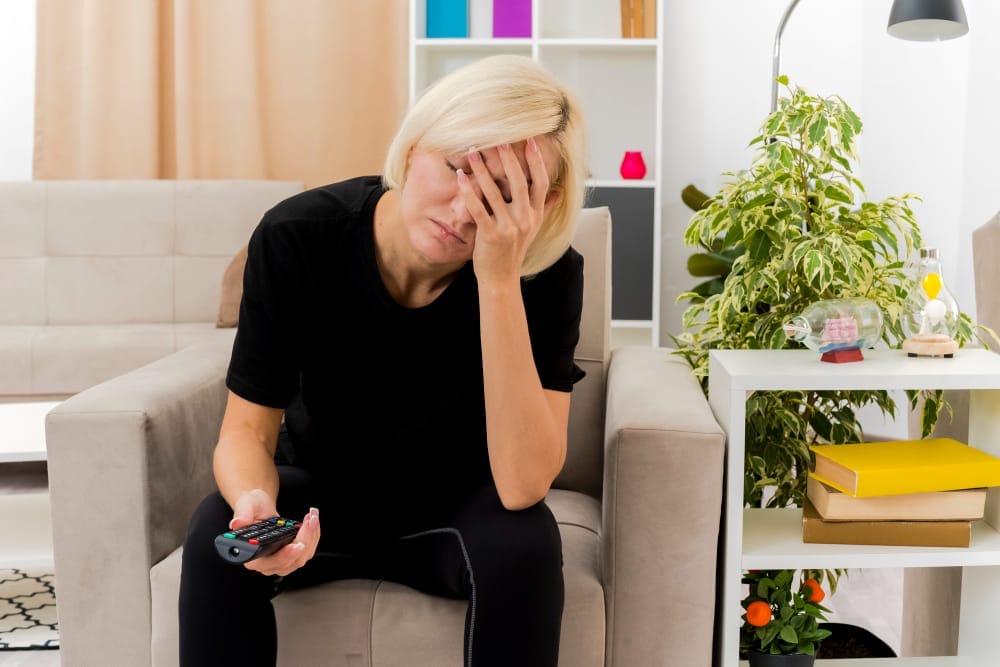
Hoarding Disorder is sometimes linked to obsessive-compulsive Disorder or OCD. People with OCD experience frequent and intense impulses to perform certain compulsive behaviors, such as washing their hands, organizing their possessions, or checking doors and windows. In some cases, hoarding may be a manifestation of these compulsive impulses.
If a loved one is struggling with OCD and hoarding, there are ways to connect and treat these conditions. Techniques such as cognitive-behavioral therapy (CBT) and Exposure and Response Prevention (ERP) can help break the cycle of obsessions and compulsions and ease the symptoms of hoarding behaviors.
Attention-deficit/hyperactivity disorder (ADHD) is another mental health condition that is sometimes linked to hoarding. People with ADHD often struggle with executive functioning skills such as time management, organizing, and decision-making. These challenges can make it difficult for them to maintain an organized living environment, leading to feelings of overwhelm and an increased likelihood of hoarding.
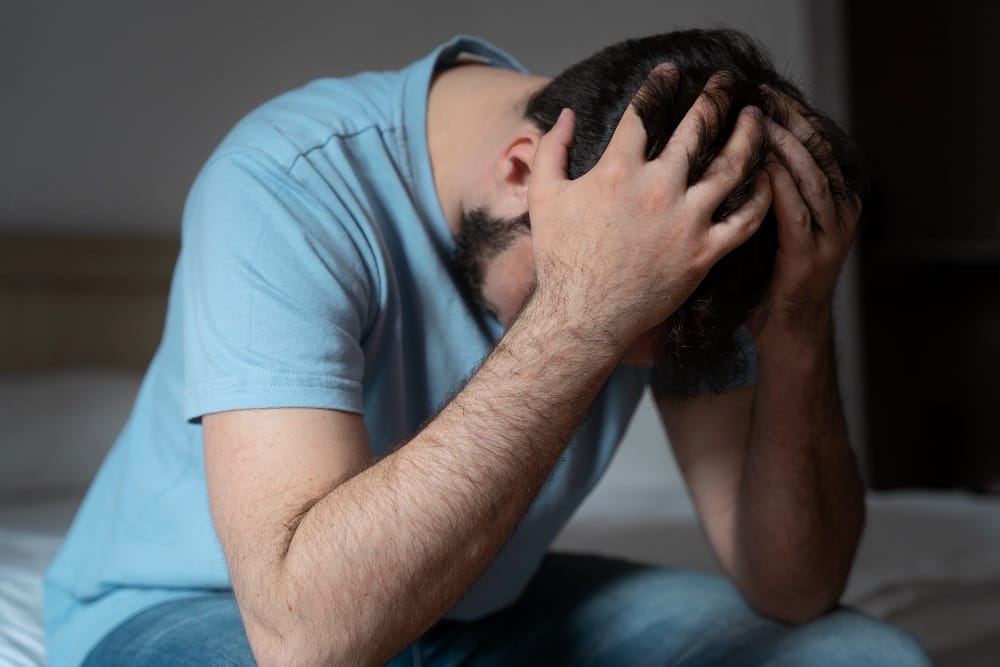
If a loved one is struggling with ADHD and hoarding, consider working with a professional organizer who has experience working with people with ADHD. They can help your loved one develop the skills they need to organize their possessions and maintain a clutter-free living space.
Hoarding is sometimes linked to trauma and post-traumatic stress disorder (PTSD). People who have experienced trauma may struggle to let go of possessions that hold emotional significance, leading to an accumulation of clutter over time. For individuals with PTSD, hoarding may be a coping mechanism for dealing with feelings of anxiety and emotional distress.
If a loved one is struggling with trauma, therapy and medication can be effective in managing symptoms of PTSD, which can help your loved one feel more in control of their hoarding tendencies.
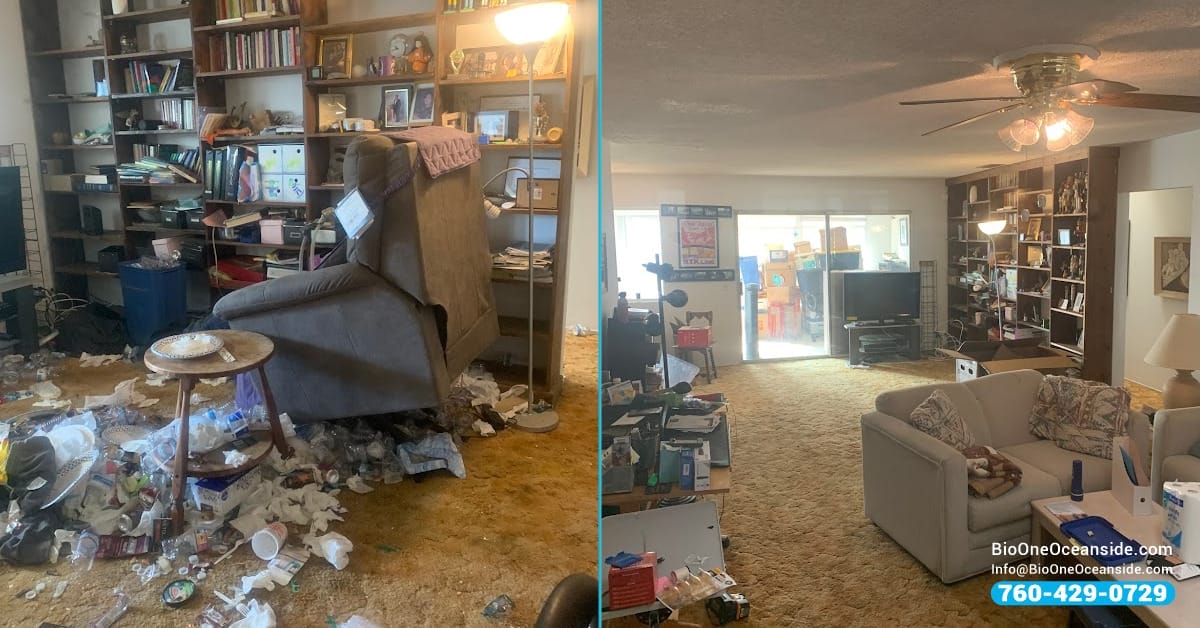
Hoarding can be a challenging condition to manage, but there are ways to help someone who is struggling. By understanding the links between hoarding and other mental health conditions, you can choose the most effective treatment approaches and provide the support your loved one needs to heal.
Remember to approach the issue with compassion and empathy, and encourage your loved one to seek help from a mental health professional experienced in treating hoarding. Additionally, Bio-One of Oceanside offers discreet hoarding cleanup services. Don't hesitate to reach out to us for support in helping your loved one on their journey towards a clutter-free and healthy home.